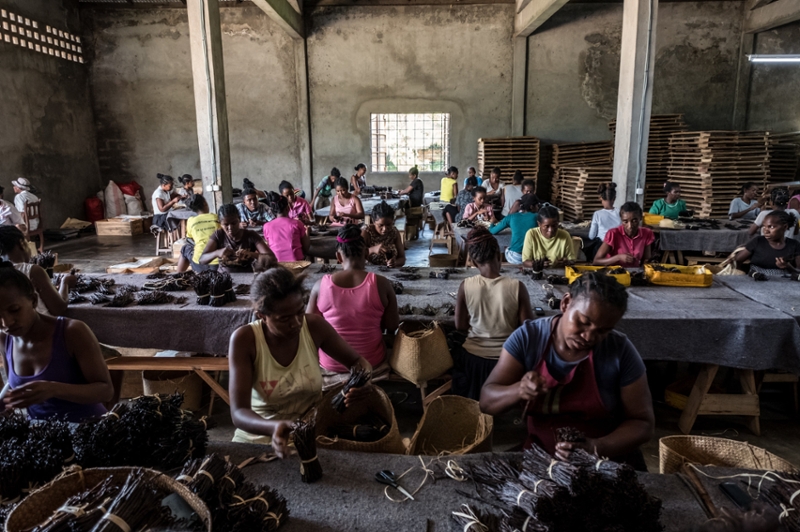
Workers sort through bundles of vanilla at the Virginia Dare warehouse in Antsirabe Nord, Madagascar. When this photo was taken last year, the warehouse contained roughly $5 million worth of vanilla. (Tommy Trenchard)
80% of the world's vanilla is grown by small holding farmers in the hilly forests of Madagascar. For a generation the price languished below $50 a kilo (about 2.2 pounds) but in 2015 it began to rise at an extraordinary rate and for the past four years has hovered at ten times that amount, between $400 and $600 a kilo.
The rise is partly due to increased global demand, partly due to decreased supply, as storms have destroyed many vines, and a lot to do with speculation. Local middle men have rushed into the market, leveraging deals between village growers and the international flavor companies that distill the cured beans into extract and sell it to the big multinationals like Mars, Archer Daniels Midland and Unilever.
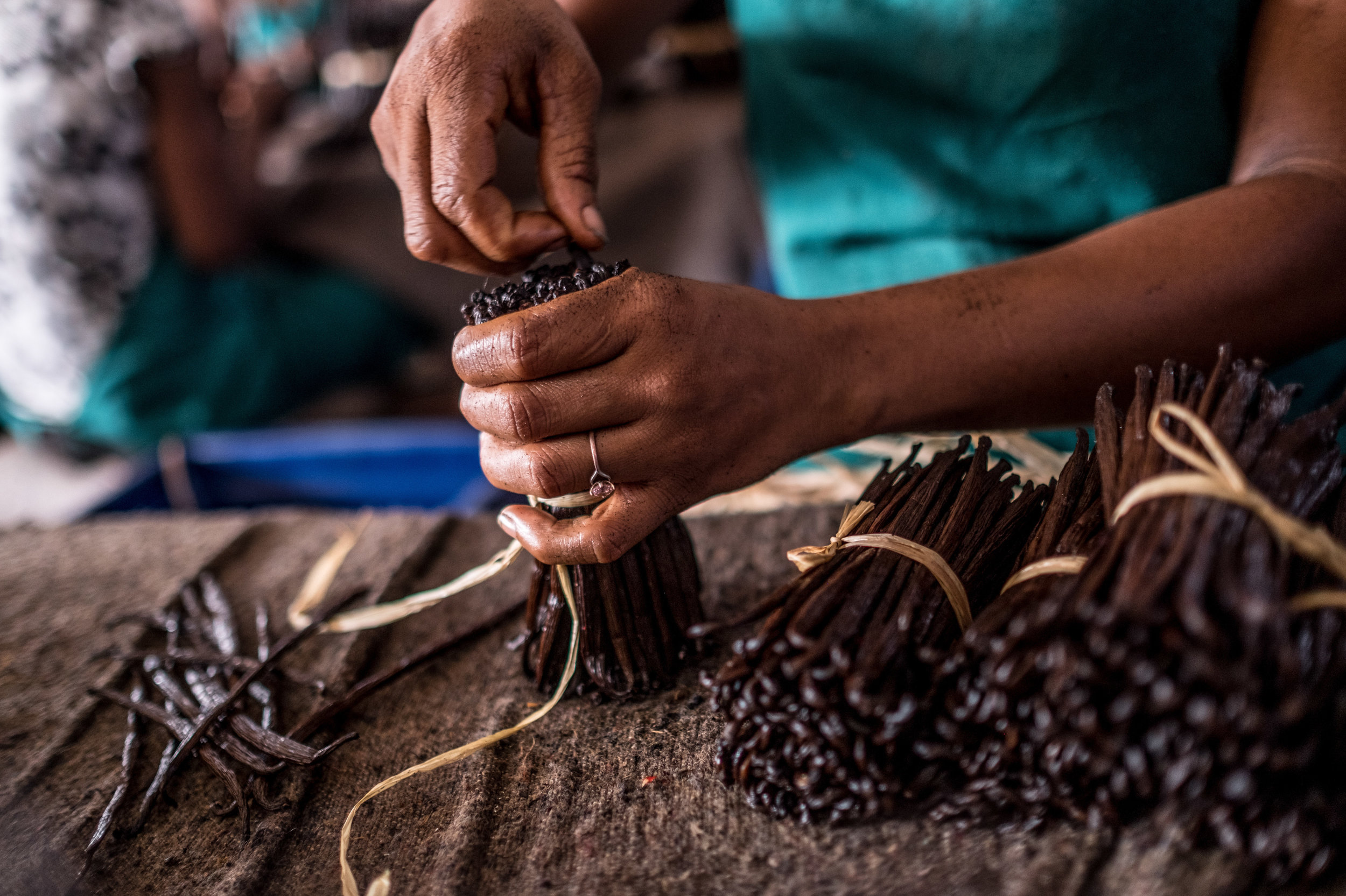
Workers sort through bundles of vanilla at a warehouse in Antalaha, Madagascar.
In the meantime farmers are getting rich, richer than their wildest dreams. Felicité Raminisoa's family has gone from subsistence farming — a little rice, bananas and coffee "but these crops didn't improve our lives," said her father — to earning over $20,000 over the past four years. That's enough to buy a new house in town (where they're sending her four children to school), a new electricity generator, better mattresses, a cow and a rice threshing machine they hope to rent out for extra income.
In December 2018 I went to the north of Madagascar, to the province of Sava, to the heart of vanilla country, to find out what effect the boom was having in the villages where vanilla is grown. Madagascar is among the ten poorest countries in the world, but huge quantities of money have poured into the region. Exact figures are hard to come by because of the cash-in-hand nature of the trade and the lack of state control or oversight, but estimates are in the high hundreds of millions a year.
A new vanilla economy had bubbled up — big shiny 4x4s lined up in the gas stations andfleets of new yellow tuk-tuk taxis throng the roads in the towns in contrast to poorer regions where hand-pulled carts are the main form of transport.
But there were army checkpoints on the road and vanilla warehouses are heavily guarded. Cash has brought opportunity but also crime.
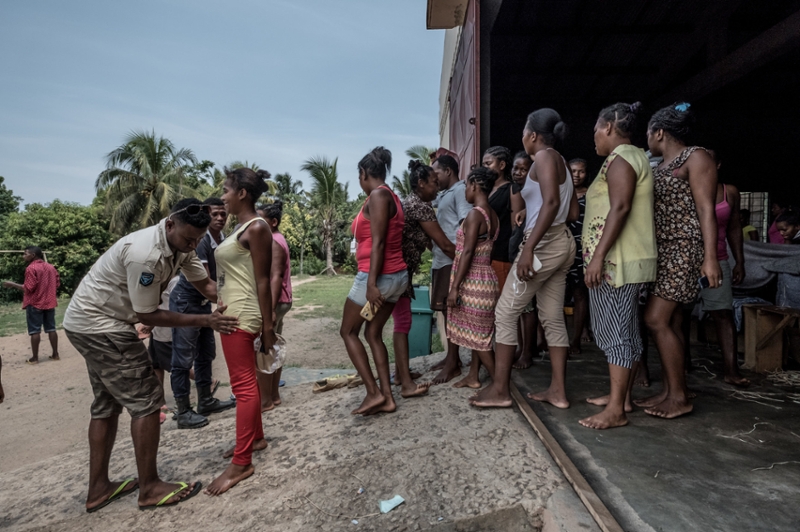
Because vanilla is so valuable, vanilla workers undergo a full search as they leave the warehouse for their lunch break.
I visited the village of Belambo, where one of the international flavor companies, Virginia Dare, works with the vanilla cooperative. The village is 11 miles from the main paved road, an hour on the back of a dirt bike, bouncing up and down a red earth track, deeply rutted and humped with rain gullies, fording rivers, rattling over plank bridges. Madagascar is the size of France but has only a few paved roads that link the country's main cities. Along the roads are banks, high schools, police stations, mobile phone shops; in the bush there are none of these amenities.
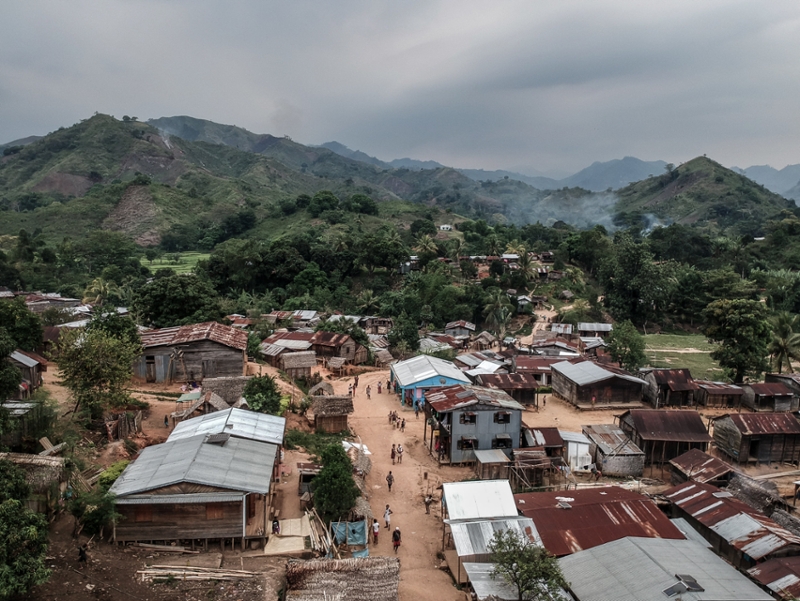
An aerial view of the village of Belambo, which lies at the heart of the vanilla-producing region in northern Madagascar.
Belambo is home to a little over 2,000 people and is made up of simple wooden houses. Now the thatched roofs have sprouted cheap Chinese solar panels, one of the first things people bought with vanilla money.
Young girls washed dishes in the river, boys played tag, the humped cattle called zebu lolled in the shade of jackfruit trees, chickens pecked in the dust. Along the road new shop-stalls were set up on porches and stoops, some selling food — zebu stew, red rice, chili sauce, a few eggs and bunches of lychees. Others sell rum or qat, a mild narcotic leaf for chewing. Such distractions were not so easily available in the bush before the villagers had disposable income.
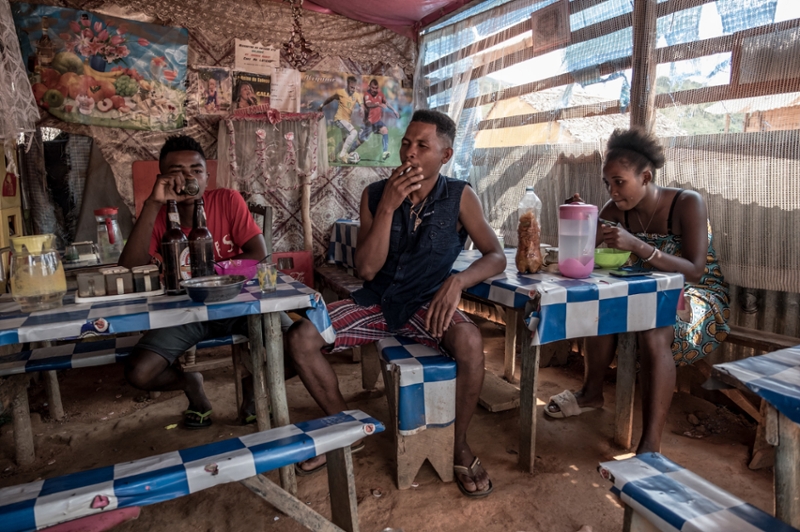
People eat lunch in a small restaurant owned by vanilla-farmer Beny Odon in Belambo, Madagascar.
You could even buy a cold beer from one of two shops that had hooked up a refrigerator to a solar panel — or a yogurt, which was not heard of here until a couple of years ago. Prices are extraordinarily high, the product of the overheated local economy. A chicken costs $10 and in high vanilla season suitcases of cash change hands.
Zaratombo (he goes by one name) is a wizened old vanilla farmer who led us on the path from the village to his patch of forest, nimbly springing barefoot across river stones and through the thick knotted roots of lychee trees. The forest is dense with the buzz of insects, spiky pineapples spring up at intervals.
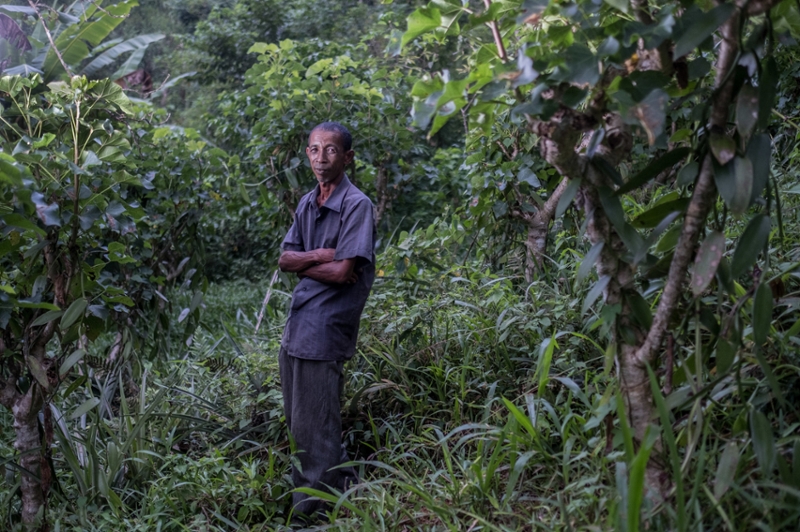
Zaratombo, a vanilla farmer and member of a local collective that sells to Virginia Dare, photographed in his field outside the village of Belambo, Madagascar.
Vanilla is an orchid vine that grows up tree trunks. After planting it takes three years to fruit. Although it is a perennial plant, it is a laborious and time consuming crop because each flower must be pollinated by hand before the green fingerling pods will grow.
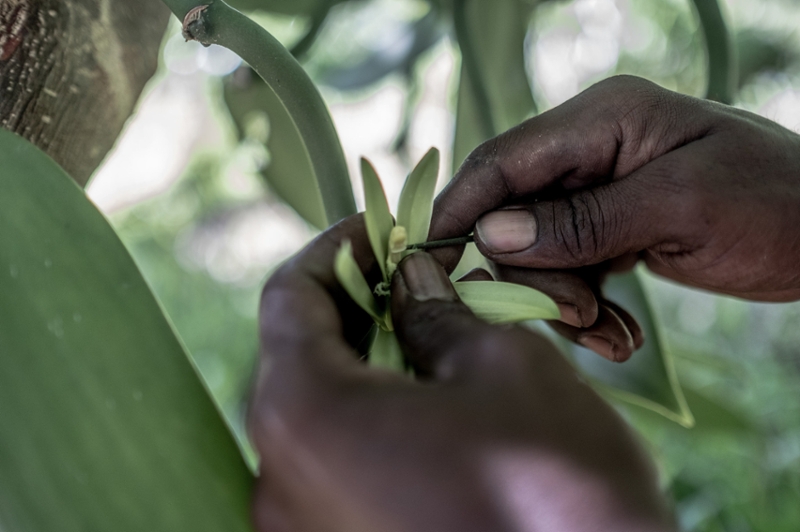
A plantation worker manually pollinates a vanilla flower at a plantation near Antalaha, Madagascar. Since each flower needs to be hand-pollinated, vanilla production is a labor-intensive enterprise.
Zaratombo is part of Belambo's vanilla cooperative, which sells directly to Virginia Dare. That company also supports the cooperative as they cure part of their vanilla crop — a process of drying, wrapping and massaging over three months. Zaratombo has been growing vanilla since 2000. "In this village vanilla is the only thing that makes any money," he says.
Almost everything else — the bananas and the local red rice that a group of women were threshing by hand on rocks beside a rice paddy below us — are grown to be eaten, not sold. Zaratombo's home was a single wooden room, but in the last year he had bought two houses in towns on the paved road and he sometimes like to go to them as "vacations."
Zaratombo and other elders have lamented that with all the new money, the old traditions of the village are changing. It used to be if you needed help in your fields everyone would come. Now people were hiring outsiders to work for them.
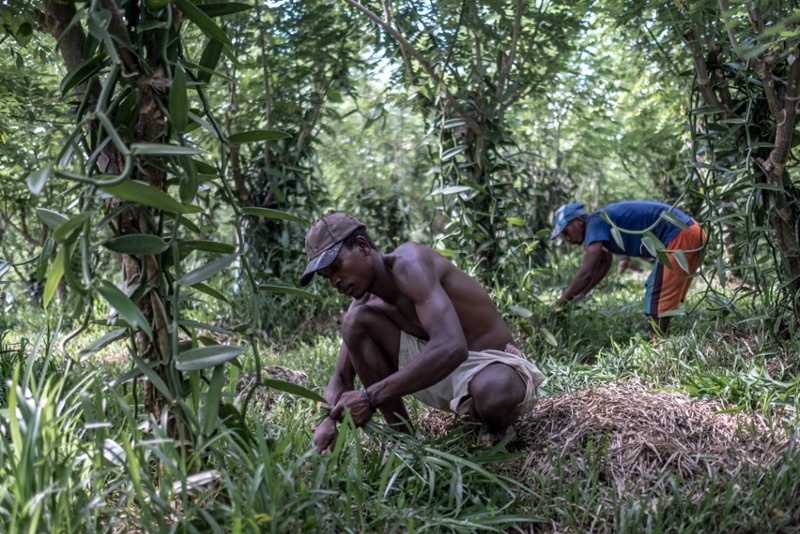
Cutting back vegetation around the base of the vines that produce the vanilla pods at a plantation near Antalaha, Madagascar.
In vanilla season, when the pods are ripening on the vines, the villagers patrol their fields with machetes and man road blocks. Zaratambo says he is too old to sleep in his fields to guard them every night. Even though he stamps his growing beans with his initials, he says, "Every year I lose something to the thieves." His wife says he should just let it go.
The majority of the thefts are by teenagers and young men. One woman I talked to, Lucila Ranivosoa, told me her cousin, 20 years old, had been caught stealing vanilla from a nearby village and just returned after spending 9 months in prison.
"He has changed," she says. "He is wiser now."
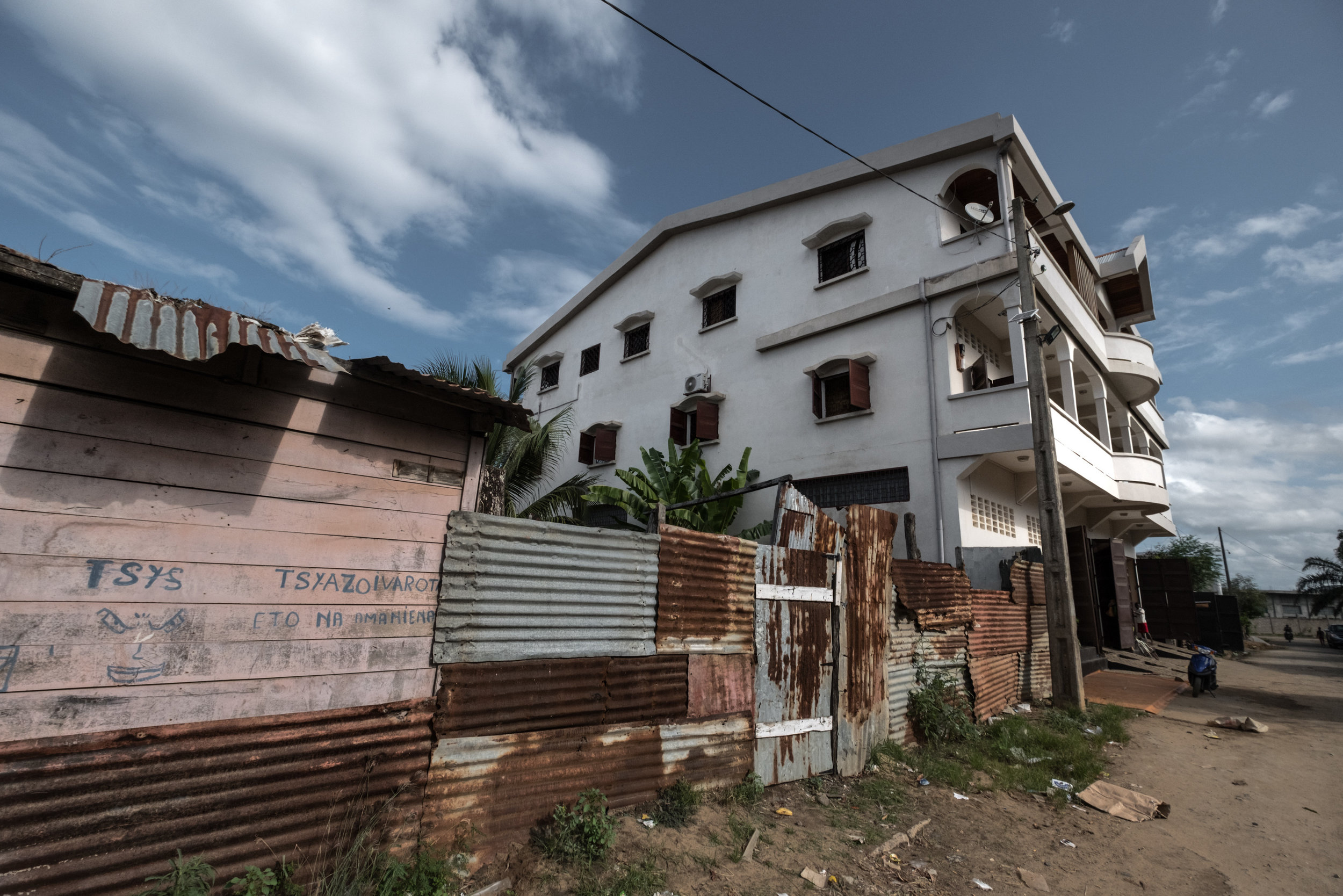
A building owned by a vanilla trader looms over small corrugated zinc shacks in the town of Antalaha, Madagascar.
There is no bank in the bush in which to deposit money. Many people hide it somewhere at home; break-ins are common. According to the Madagascan Central Bank, there are millions of euros hidden in the Sava region under mattresses.
Foreign flavor companies have begun to support vanilla villages, working with nonprofit groups on different projects — from building primary schools to organizing health insurance and local cooperatives. They want to be able to ensure a steady supply of good quality vanilla by going straight to the source because over the past few years, middle men and brokers have pushed up prices even as the quality of the vanilla — picked unripe to protect it from thieves, passed through multiple hands and not cured properly — has gone down.
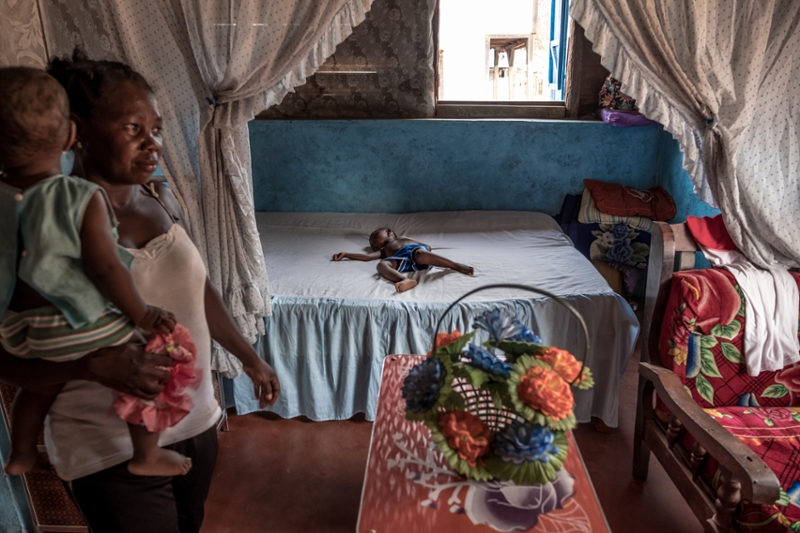
A boy sleeps in a large bed in the spacious home of successful vanilla farmer in Belambo village, Madagascar.
Lucila Ranivosoa is a member of a female microcredit circle of perhaps 20 women, supported by Virginia Dare and a French NGO, Positive Planet, that has been working to build financial capacity in villages where people often have little more than a rudimentary education and little access to banks, credit or information. In the microcredit group, each woman contributes an equal sum. The money is kept in a large wooden strong box, with four padlocks and four keys distributed among four of the women. Before the vanilla boom, says Ranivosoa, "there was poverty, some who were hungry, there was nothing to do."
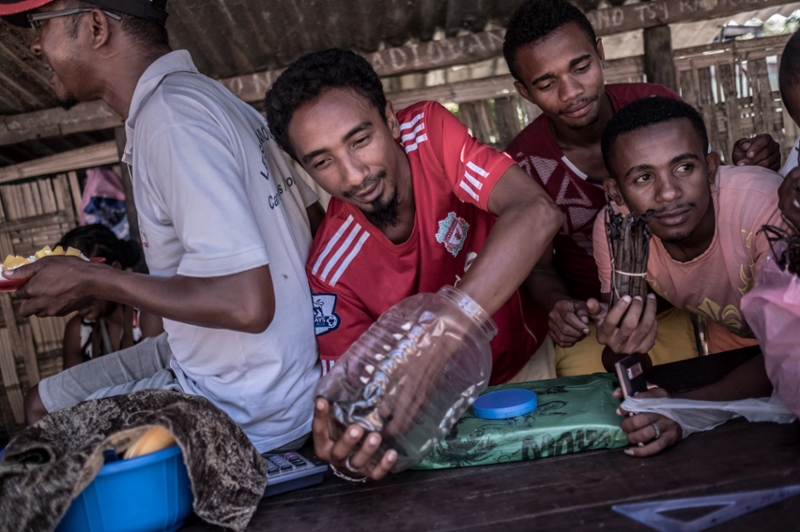
Street trader Randria Albert Francois with colleagues at his stall in Antalaha, Madagascar.
With a loan from the fund, one woman has been able to start a business making wooden furniture, another opened a small grocery store, another hoped to keep chickens to sell their eggs. The same microcredit group has also started a rice bank, buying rice in season when prices are lower and storing it in a warehouse built for them by Virginia Dare. Then they can sell the rice to members at affordable prices before the harvest, when rice is short and prices are high.
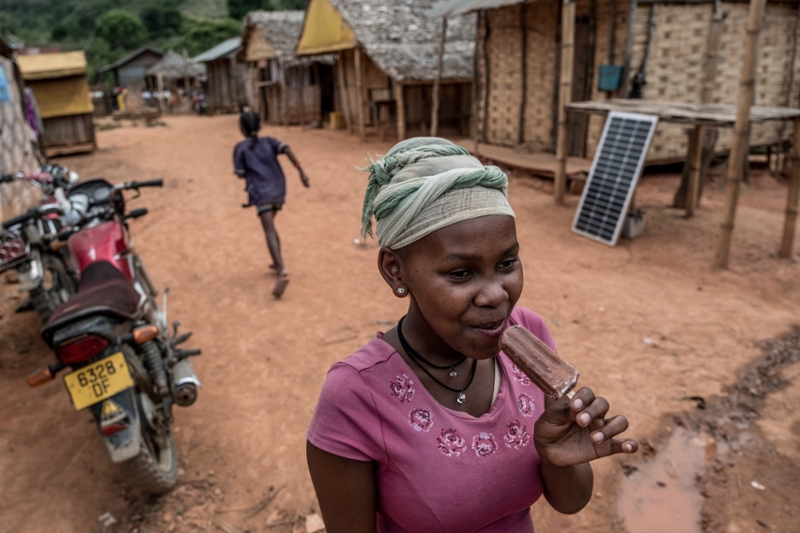
A girl eats chocolate ice cream in Belambo village, Madagascar. Even though the village is at the heart of the country's vanilla-growing region, vanilla is not a common flavoring here.
But local businesses are dependent on local demand, and when the price of vanilla turns down, that will inevitably lessen. The trick, as Agnes Hiere of Positive Planet told me, was to encourage diversification.
"We know that the vanilla price can't last," Ranivosoa says, "and that's why we are looking far into the future."
Wendell Steavenson went to Madagascar for the Economist's 1843 Magazine and first wrote about vanilla here. She spent many years reporting from the Middle East before turning her attention to writing about food and how it reflects and illustrates society, economics, politics and just about everything. She has written three nonfiction books and one novel and is about to move from Paris to Washington, D.C.
Tommy Trenchard is a freelance writer and photographer working mostly in Africa and the Middle East.












